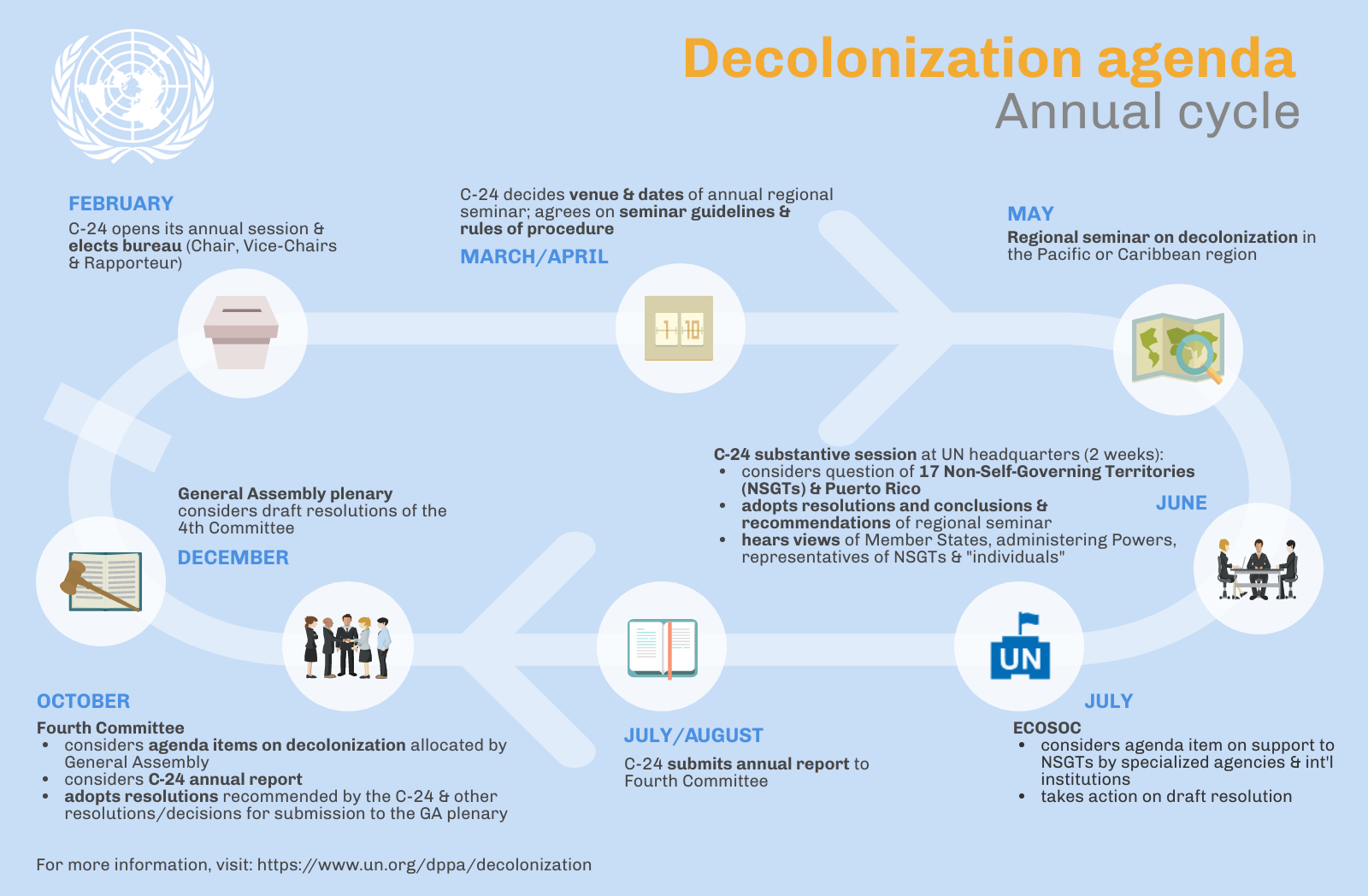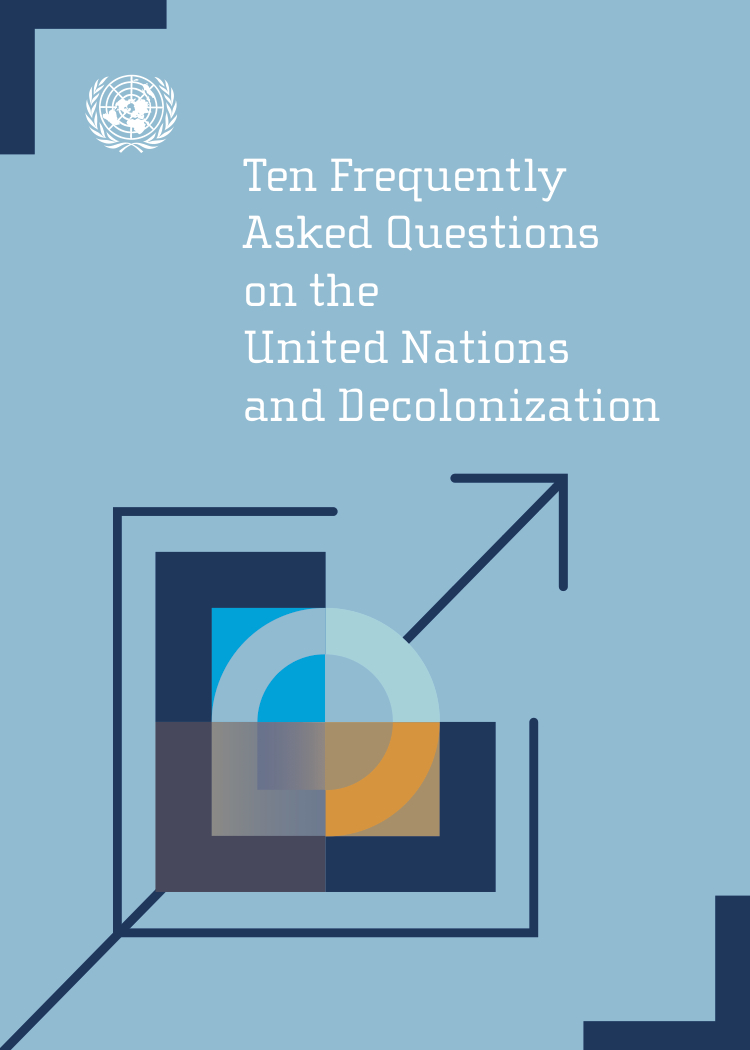United Nations and decolonization
When the United Nations was established in 1945, 750 million people - almost a third of the world's population then - lived in Territories that were non-self-governing, dependent on colonial Powers.
Since then, more than 80 former colonies have gained their independence. Among them, all 11 Trust Territories have achieved self-determination through independence or free association with an independent State. Former Non-Self-Governing Territories ceased to be on the list of Non-Self-Governing Territories due to their change in status or as a result of their choice of independence, free association or integration with an independent State. Today, there are 17 Non-Self-Governing Territories remaining and fewer than 2 million people live in such Territories.
Timeline: Historical overview
The decolonization efforts of the United Nations derive from the principle of “equal rights and self-determination of peoples” as stipulated in Article 1 (2) of the Charter of the United Nations, as well as from three specific chapters in the Charter which are devoted to the interests of dependent peoples. The Charter established, in its Chapter XI ("Declaration regarding Non-Self-Governing Territories", Articles 73 and 74), the principles that continue to guide the decolonization efforts of the United Nations. The Charter also established the International Trusteeship System in Chapter XII (Articles 75-85) and the Trusteeship Council in Chapter XIII (Articles 86-91) to monitor the Trust Territories.
The Charter binds administering Powers, namely "Members of the United Nations which have or assume responsibilities for the administration of territories whose peoples have not yet attained a full measure of self-government", in the language of the Charter, to recognize that the interests of dependent territories are paramount, to agree to promote social, economic, political and educational progress in the Non-Self-Governing Territories with due respect for the culture of the peoples concerned, to assist the peoples in developing appropriate forms of self-government, and to take into account the political aspirations and stages of development and advancement of each Non-Self-Governing Territory. Administering Powers are also obliged under the Charter to transmit to the United Nations information on conditions in the Non-Self-Governing Territories. The United Nations monitors progress towards self-determination in the Non-Self-Governing Territories.
In 1960, the General Assembly adopted the Declaration on the Granting of Independence to Colonial Countries and Peoples (General Assembly resolution 1514 (XV)), known also as the Declaration on Decolonization. By this resolution, the General Assembly, considering the important role of the United Nations in assisting the movement for independence in Trust and Non-Self-Governing Territories, solemnly proclaimed the necessity of bringing colonialism in all its forms and manifestations to a speedy and unconditional end, and in this context, declared, inter alia, that all people had a right to self-determination.
According to General Assembly resolution 1541 (XV) of 1960 entitled "Principles which should guide Members in determining whether or not an obligation exists to transmit the information called for under Article 73 e of the Charter", a Non-Self-Governing Territory can be said to have reached a full measure of self-government by:
• Emergence as a sovereign independent State;
• Free association with an independent State;
• Integration with an independent State.
In addition, by the "Declaration on Principles of International law concerning Friendly Relations and Cooperation among States in accordance with the Charter of the United Nations", as approved by the General Assembly by its resolution 2625 (XXV) of 1970, the General Assembly solemnly proclaimed the principles of international law concerning friendly relations and cooperation among States, including the principle of "equal rights and self-determination of peoples". In that principle, it is stated that the "establishment of a sovereign and independent State, the free association or integration with an independent State or the emergence into any other political status freely determined by a people constitute modes of implementing the right of self-determination by that people".
Intergovernmental bodies of the United Nations dealing with decolonization agenda
The General Assembly, by its resolution 66 (I) of 1946, initially set up an ad hoc committee "to examine the Secretary-General's summary and analysis of the information transmitted under Article 73 (e) of the Charter with a view to aiding the General Assembly in its consideration of this information" which was composed in equal number of representatives of the Members transmitting information under Article 73 e of the Charter and of representatives of Members elected on the basis of an equitable geographical representation. In subsequent years, the Special Committee on Information Transmitted under Article 73 e of the Charter, later renamed as the Committee on Information from Non-Self-Governing Territories, took over the task to examine the summaries and analyses of information transmitted under Article 73 e of the Charter, including any papers prepared by the specialized agencies, and was dissolved in 1963 (see General Assembly resolutions 146 (II), 219 (III), 332 (IV), 333 (IV), 569 (VI), 646 (VII), 933 (X), 1332 (XIII), 1700 (XVI) and 1970 (XVIII)).
In 1961, the General Assembly, by its resolution 1654 (XVI), established the Special Committee on the Situation with regard to the Implementation of the Declaration on the Granting of Independence of Colonial Countries and Peoples (also known as the Special Committee on Decolonization or C-24), as its subsidiary organ, to monitor implementation of the 1960 Declaration on Declaration and to make recommendations on its application. The C-24 commenced its work in 1962 with the original 17 members, which was immediately expanded to 24 members by the end of 1962 (for more details on membership, see C-24 Members page). Following the dissolution of the Committee on Information from Non-Self-Governing Territories, the C-24 was tasked to study information transmitted as prescribed under Article 73 e of the Charter, pursuant to General Assembly resolution 1970 (XVIII).
Agenda items relating to decolonization are also considered by the Special Political and Decolonization Committee (Fourth Committee), one of the Main Committees of the General Assembly. The Fourth Committee considers recommendations of the C-24 and prepares draft resolutions and decisions for submission to the plenary of the General Assembly.
Infographic: Decolonization - the annual cycle

Content simplified for visual purposes.To enlarge, click here.
Support and assistance by the United Nations
Currently, the C-24 and its bureau, as well as the Fourth Committee during its decolonization segment, are assisted by the Decolonization Unit of the Department of Political and Peacebuilding Affairs (DPPA) for substantive support and by the Department for General Assembly and Conference Management (DGACM) for procedural support. The Department of Global Communications (DGC) carries out a number of outreach and other activities related to dissemination of information on decolonization.
For more information concerning support and assistance by the United Nations, particularly by United Nations Regional Commissions, funds and programmes, specialized agencies, please refer to the publication entitled "What the UN Can Do to Assist Non-Self-Governing Territories" by the DGC.


